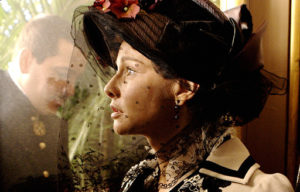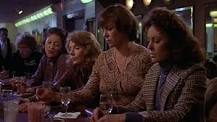“All happy families are alike; each unhappy family is unhappy in its own way.”
Leo Tolstoy,

Òàòüÿíà Äðóáè÷ (Àííà Êàðåíèíà) â ñöåíå èç ôèëüìà ðåæèññåðà Ñåðãåÿ Ñîëîâüåâà “Àííà Êàðåíèíà” ïî ðîìàíó Ë.Í.Òîëñòîãî. (Ôîòî ïðåäîñòàâëåíû ñòóäèåé Ñåðãåÿ Ñîëîâüåâà)
Brother, you said a mouthful.
So I’m going to have lunch Saturday with two of my favorite lady friends, Pat and Susan. Pat is a triathlete who wants to become a writer. Sue is a gifted artist who likes to talk about writing, and is most encouraging. What could make for a nicer luncheon? I have a book to give Pat, entitled Bird by Bird by Anne Lamott. It’s a book about writing. I read it about 20 years ago, and many of its lessons stuck with me when I began to write in earnest. Guess they got into my subconscious, because I didn’t recall reading the book or hearing her advice. Isn’t that the best way to learn something?
In preparation for this luncheon, I summoned my inner voice, and we had a dialogue about writing, which led to some thoughts about literary criticism. You know the old saw: those who can write, those who can’t become critics? Christopher Hitchens may be the exception: didn’t he write “I am a Camera”, from whence cometh Cabaret? I think so – have to look it up, but I don’t want to lose my train of thought, so stay tuned on this one.
OK – so I asked my inner voice, “What is our favorite book of all time?”
Inner voice: “Gee, that’s easy: Diary of a Mad Housewife by Sue Kaufman. You noodlehead, you were just reading some early chapters of the book this morning when you couldn’t sleep.”
Diary of a Mad Housewife by Sue Kaufman. You noodlehead, you were just reading some early chapters of the book this morning when you couldn’t sleep.”
Me: “Oh yeah – that’s right.”
So I thought I’d ask the ladies whether they have that kind of book – a ‘go-to’ book in times of trouble and/or happiness – just for the pleasure of reading it again?
Then I recalled that when I was a charter member of the Millstone Book Club from 2010 to our departure in 2016, I only recommended two books to the group: Temple Grandin’s book, Animals in Translation and, of course, Diary of a Mad Housewife.
Animals in Translation and, of course, Diary of a Mad Housewife.
They ladies in the group didn’t understand or appreciate either one of them.
I’ll dispense with a discussion about Grandin’s book, because it was just not something they had any interest in. But we had a most lively discussion about “Diary” and the main character, Tina Balser. The book club ladies fell into two very distinct camps: liked it; hated it. Loved the main character; despised the woman. Hmm.
But here’s the thing: I recall going into writer’s mode, so as not to get defensive when one of the more vocal ladies trashed the book I’d read 162 times (well, maybe I’m exaggerating, but likely not by much). Going into writer’s mode allowed me to probe why she hated the character and the book. Here’s what she said, and the gaggle of haters vehemently agreed that this was the problem:
“I could not understand why this woman was so unhappy. She had everything a woman could possibly want or ask for. And for that woman to jeopardize it all by having an affair was disgusting.”
Wow.
Okay!
The likers couldn’t overcome the animus of the haters, but that’s not important here. Because the most vocal hater then asked me the magic question: “Why did you like this book enough to recommend that we read it?”
I recall being surprised by the question, and hence had a most inarticulate response, something like “I first read it at a very difficult time in my life and it helped me cope with stress and difficulty.” How’s that for lame?
But I loved the book because it was intelligent. The main character was nothing like me, yet because Kaufman likely wrote about her own life, she did so with total authenticity. I didn’t necessarily want to be her – I wanted to know her and have her as a friend. Sort of brings to mind the friends in the movie  An Unmarried Woman. It also brings to mind Anna Karenina, because – as I figured out so many years later – “Diary” is just another version of “Anna” set in New York in the 1960’s. The difference is Anna loses everything and throws herself in front of a train. Tina loses nothing and decides to settle for urban mediocrity. But I think it’s fair to point out that Sue Kaufman jumped off the balcony of her 18th floor apartment at age 50. That was the real end of Tina Balser.
An Unmarried Woman. It also brings to mind Anna Karenina, because – as I figured out so many years later – “Diary” is just another version of “Anna” set in New York in the 1960’s. The difference is Anna loses everything and throws herself in front of a train. Tina loses nothing and decides to settle for urban mediocrity. But I think it’s fair to point out that Sue Kaufman jumped off the balcony of her 18th floor apartment at age 50. That was the real end of Tina Balser.
So now I have two friends that are intelligent, artistic and just great fun to be with. I hope we have regular times together, lunches, social gatherings, whatever, that allows us to talk about art, books, movies and writing. Because there is nothing better than taking that cocktail party in your head and transferring it to real dialogue with real women you really like.
Post script: Oops – big time wrong. It wasn’t Christopher Hitchens – it was  Christopher Isherwood, who was not a critic. So no exceptions to the rule, I suppose. Hmm..
Christopher Isherwood, who was not a critic. So no exceptions to the rule, I suppose. Hmm..
